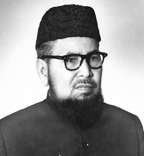Maulvi Tamizuddin Khan
Maulvi Tamizuddin Khan (M. T. Khan; March 1889 – 19 August 1963)[1][2] was the Speaker of Pakistan's Constituent Assembly from 1948 to 1954 and National Assembly of Pakistan between 1962 and 1963.[3]
Maulvi Tamizuddin Khan | |
|---|---|
মৌলভি তমিজউদ্দিন খান | |
 | |
| 2nd & 4th Speaker of the National Assembly | |
| In office 11 June 1962 – 19 August 1963 | |
| Deputy | Mohammad Afzal Cheema |
| Preceded by | Abdul Wahab Khan |
| Succeeded by | Fazlul Qadir Chaudhry |
| In office 14 December 1948 – 24 October 1954 | |
| Deputy | M.H. Gazder |
| Preceded by | Mohammad Ali Jinnah |
| Succeeded by | Abdul Wahab Khan |
| 1st Deputy Speaker of the National Assembly of Pakistan | |
| In office 23 February 1948 – 13 December 1948 | |
| Preceded by | Office established |
| Succeeded by | Muhammad Hashim Gazdar |
| Personal details | |
| Born | March 1889 Faridpur, Bengal Presidency, British India |
| Died | 19 August 1963 (aged 74) Dacca, East Pakistan, Pakistan |
| Political party | Muslim League (1915–1963) Indian National Congress (1921–1926) |
| Children | Razia Khan (daughter) |
| Alma mater | Presidency College, Kolkata Surendranath College University of Calcutta |
Early life
Khan completed his master's in English in 1913 and LLB in 1915 and started his legal profession in Faridpur.[2] He was elected vice-chairman of Faridpur Municipality. In 1926, he got elected to the Bengal Legislative Assembly from Faridpur.[2] He joined the Indian National Congress. He later became the secretary of the Anjuman-i-Islamia and subsequently joined the Muslim League.[2]
Career
Khan created history when the Constituent Assembly was dismissed by Governor General Ghulam Mohammad in 1954. Khan challenged the dismissal in the court and the case was filed in the morning of 7 November 1954, by Advocate Manzar-e-Alam.[4] Although the High Court agreed and overturned it, the Federal Court under Justice Muhammad Munir upheld the dismissal. He had been president of the Basic Principles Committee set up in 1949.
"Justice A. R. Cornelius was the sole dissenting judge in the landmark judgment handed down by the Supreme Court in the Maulvi Tamizuddin case. That judgment altered the course of politics in Pakistan forever and sealed the fate of democracy. The law had guided him as he had interpreted it and his conscience.".[5]
The decision to uphold the dismissal of the constituent assembly was to mark the beginning of the overt role of Pakistan's military and civil establishment in Pakistani politics.[6]
Personal life
Khan's daughters' were Razia Khan and Qulsum Huda Khan.[7][8] Razia was an Ekushey Padak winning writer and poet.[9] Qulsum was one of the founders and vice-chancellors of Central Women's University.[10]
References
- Council, West Bengal (India) Legislature Legislative (1963). Council Debates: Official Report (in Bengali). West Bengal Government Press.
- Islam, Sirajul (2012). "Khan, Tamizuddin". In Islam, Sirajul; Ahsan, Manzur (eds.). Banglapedia: National Encyclopedia of Bangladesh (Second ed.). Asiatic Society of Bangladesh.
- "SPEAKERS". www.findpk.com. Retrieved 23 November 2017.
- The Test of Time: My Life and Days by Maulvi Tamizuddin Khan, Chapter Six.
- For the Love of Cricket' by Omar Kureishi "Archived copy". Archived from the original on 5 September 2008. Retrieved 15 December 2008.CS1 maint: archived copy as title (link)
- "Parlamientary History". na.gov.pk. Archived from the original on 5 July 2008. Retrieved 23 November 2017.
- "Those who passed on…". The Daily Star. 1 January 2012. Retrieved 24 August 2018.
- "Dr. M.N. Huda : As I knew him". The Daily Star. 1 August 2008. Retrieved 24 August 2018.
- "Razia Khan Amin's 2nd anniversary of death today". The Daily Star. 28 December 2013. Retrieved 24 August 2018.
- "Simeen's works a beacon of light". The Daily Star. 29 April 2018. Retrieved 24 August 2018.

